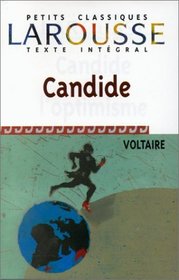The book helps give you a different perspective of the world and of life. It shows you an evil world from a simpletons point of view who was raised by an optimist. It's the inspiration for Forrest Gump.
"In Candide (Voltaire) whisks his young hero and friends through a ludicrous variety of tortures, tragedies and reversals of fortunes, in the company of Pangloss, a 'metaphysico-theologo-cosmolo-niologist' of unflinching opinion. The result is one of the glories of eighteenth-century satire."
I've never enjoyed satire more than I did while reading Candide.
Caustic and hilarious, Candide has ranked as one of the world's great satires since its first publication in 1759. It concerns the adventures of the youthful Candide, disciple of Leibniz.
Funny, ironic satire. If you enjoy subtle, self-deprecating humor, you will love this classic!
2 tapes, 3 hrs. Read by Michael York. English translation, of course. A classic satire that really is a philosophical treatise.
Rating: 4.5/5
This book comes with footnotes and endnotes to provide context for some of the popular and cultural references in Voltaire's time. This is a fantastic satire of the philosophy of optimism. Although not a popular movement these days, it is still easy to appreciate the mental lashing he gives to followers of optimism.
The story is a frenetic rush from one crazy encounter to the next, with ill-fortune and dispair always growing along the journey. The morale of the story is that everyone is doomed to a miserable existence, but it's a fun read, I swear!
Weird, at times gross, also real crazy. Really good though.
This translation from the fench can be a little stodgy, but if you keep with it, it's actually a great read.
A classic, in original French
Political satire doesn't age well, but occasionally a diatribe contains enough art and universal mirth to survive long after its timeliness has passed. Candide is such a book. Penned by that Renaissance man of the Enlightenment, Voltaire, Candide is steeped in the political and philosophical controversies of the 1750s. But for the general reader, the novel's driving principle is clear enough: the idea (endemic in Voltaire's day) that we live in the best of all possible worlds, and apparent folly, misery and strife are actually harbingers of a greater good we cannot perceive, is hogwash.
Telling the tale of the good-natured but star-crossed Candide (think Mr. Magoo armed with deadly force), as he travels the world struggling to be reunited with his love, Lady Cunegonde, the novel smashes such ill-conceived optimism to splinters. Candide's tutor, Dr. Pangloss, is steadfast in his philosophical good cheer, in the face of more and more fantastic misfortune; Candide's other companions always supply good sense in the nick of time. Still, as he demolishes optimism, Voltaire pays tribute to human resilience, and in doing so gives the book a pleasant indomitability common to farce. Says one character, a princess turned one-buttocked hag by unkind Fate: "I have wanted to kill myself a hundred times, but somehow I am still in love with life. This ridiculous weakness is perhaps one of our most melancholy propensities; for is there anything more stupid than to be eager to go on carrying a burden which one would gladly throw away, to loathe one's very being and yet to hold it fast, to fondle the snake that devours us until it has eaten our hearts away?"--Michael Gerber
I REALLY enjoyed this book! The translation is great, and the pictures are just fantastic. I greatly recommend it. :)
This Norton Critical Edition includes not only the text of this famous work but essays of criticism as well.




